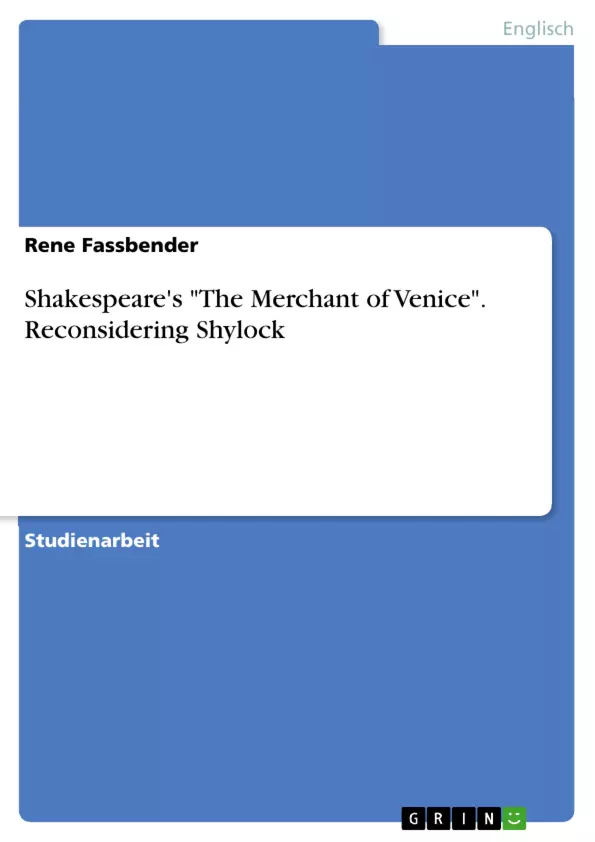This paper offers a detailed analysis of Shylock's depiction in Shakespeare's "Merchant of Venice" and why he may not be a typical villain (or a villain at all).
Undoubtedly, "The Merchant of Venice" is one of Shakespeare's most controversial plays, courtesy of the both interesting and complex character of Shylock the Jew. The play is basically a romantic comedy but the requirements of genre are scorned. It begins with brotherly love and ends with joy, at least for the Christians. However, in between, there is Shylock, who adds a very serious undertone to the play and makes it oddly profound for a comedy.
Although Shylock appears in but five out of twenty scenes, he represents a permanent threat and overshadows most of the play. No other character has so much "force, subtlety, vitality, variety; above all, none other has his intensity, isolation and apparent depth of motivation." It would be all too easy to explain this motivation and the way he is presented by means of mere anti-Semitism and stereotypes. Although Shakespeare could not ignore the prejudices of his time, "we should beware of attributing to Shakespeare and his audiences the cruelty of our own century." Those who intend to track down anti-Semitism in the play will not fail to find it. All too often, however, they will be blind to everything else and make the regrettable mistake of cutting both Shylock's character and the complexity of the play. There is more to Shylock, much more. His character can and should have the power to make the audience think.
Thus, one should have a close look at Shylock starting with the first things we get to know about him but without being oblivious to the social and historical background of the play's original reception. Furthermore, it is necessary to examine the depths of his character by means of analysing the development as well as the degree of obviousness of his motivation in order to disclose what moves and drives him. In the end, it should be possible to realise the underlying cause of his actions and draw corresponding conclusions.
Inhaltsverzeichnis
- Introduction
- Usury and Jews
- Two Worlds in Venice
- Religion and Greed
- Revenge and Justice
- Teasing Purification
Zielsetzung und Themenschwerpunkte
Die vorliegende Arbeit befasst sich mit der Figur des Shylock in Shakespeares "The Merchant of Venice" und untersucht die Komplexität seiner Motivation sowie die historischen und sozialen Aspekte seiner Darstellung im Kontext des Stückes.
- Die Darstellung des antisemitischen Stereotyps des Juden als Wucherers
- Der Konflikt zwischen den christlichen und jüdischen Welten im Venedig des 16. Jahrhunderts
- Die Rolle von Shylock im Kontext des Stückes als Komödie und seine Auswirkungen auf die Moral der christlichen Figuren
- Die Analyse der Motivationen und Handlungen des Shylock im Hinblick auf seine Moral und seine eigene Rechtfertigung
- Die Bedeutung des Stückes im Hinblick auf die gesellschaftlichen Verhältnisse der Zeit
Zusammenfassung der Kapitel
Introduction
Dieses Kapitel führt den Leser in die Thematik des Stückes "The Merchant of Venice" ein und erläutert die besondere Bedeutung der Figur Shylock. Es werden die Kontroversen um Shylock und die Schwierigkeit, seine Motivationen und Handlungen nur auf antisemitische Stereotype zu reduzieren, aufgezeigt.
Usury and Jews
Das Kapitel analysiert den Zusammenhang zwischen Shylocks Rolle als Wucherer und der damaligen antisemitischen Haltung gegenüber Juden in England. Es beleuchtet die historischen und sozialen Hintergründe des Antisemitismus im 16. Jahrhundert und die Rolle von Shylock als Repräsentant eines gesellschaftlichen Ausstoßers.
Two Worlds in Venice
Dieses Kapitel beleuchtet den Kontrast zwischen der Welt der christlichen Figuren und der Welt des Shylock. Es werden die unterschiedlichen Werte und Moralvorstellungen der beiden Gruppen sowie die ambivalenten Beziehungen zwischen ihnen im Kontext des Stückes analysiert.
Schlüsselwörter
Shylock, "The Merchant of Venice", Antisemitismus, Wucher, Stereotype, Moral, Gerechtigkeit, Religion, Gesellschaft, Venedig, Shakespeare, Renaissance, Mittelalter.
Häufig gestellte Fragen
Ist Shylock in "The Merchant of Venice" ein typischer Bösewicht?
Die Arbeit argumentiert, dass Shylock eine komplexe Figur mit tiefgehender Motivation ist, die weit über das Klischee eines einfachen Schurken hinausgeht.
Wie wird das Thema Antisemitismus im Stück analysiert?
Die Analyse beleuchtet die Vorurteile der Renaissance-Zeit und warnt davor, Shylock nur durch die Linse moderner oder historischer Stereotype zu betrachten.
Was treibt Shylock zu seinem Racheplan gegen Antonio?
Seine Motivation speist sich aus jahrelanger Demütigung durch die Christen, religiöser Ausgrenzung und dem Verlust seiner Tochter und seines Vermögens.
Welche Rolle spielt der Wucher (Usury) in der Charakterisierung?
Wucher war eines der zentralen antisemitischen Stereotype; die Arbeit zeigt jedoch, dass Shylocks Handeln auch eine Reaktion auf seine soziale Isolation ist.
Warum wird das Stück oft als "problematische Komödie" bezeichnet?
Obwohl es Gattungselemente einer Komödie enthält, verleiht Shylocks tragisches Schicksal dem Werk einen ernsten und tiefgründigen Unterton.
Wie unterscheiden sich die Welten von Venedig und Belmont?
Die Arbeit kontrastiert die merkantile, harte Welt Venedigs mit der romantischen, fast märchenhaften Welt von Belmont.
- Citation du texte
- Rene Fassbender (Auteur), 2004, Shakespeare's "The Merchant of Venice". Reconsidering Shylock, Munich, GRIN Verlag, https://www.grin.com/document/310363



